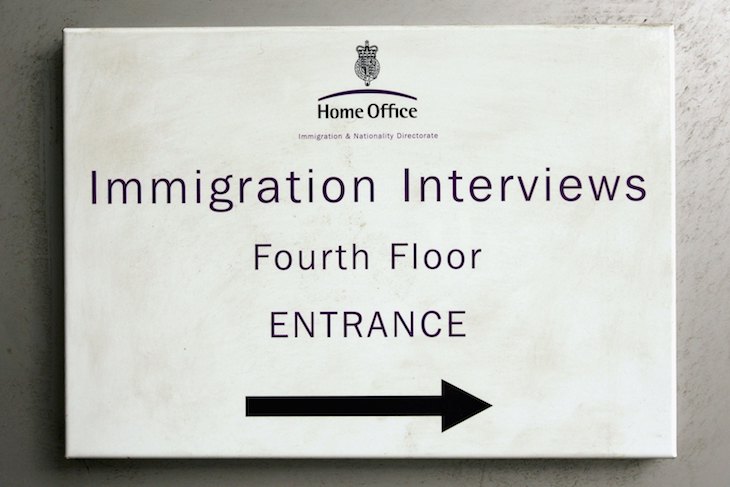What I remember about preparing to leave for my husband’s appointment with the Home Office in Croydon in 2007 is hysteria. A tizzy was not unprecedented; in our household, it’s always the man who’s in a dither, seeing to last-minute primping and chronically unable to get out the door on time. But on this occasion I, too, was rattled, snapping impatiently as I double-checked an enormous bag of documents. A fair bit was at stake.
An American, I had acquired my own Indefinite Leave to Remain (ILR) — a grand designation for ‘residency’ that only the British would coin — during a looser era of the Writers and Artists Visa, long ago eliminated. So the hoop-jumping that the Home Office had come to require for gaining the same status was new to me.
To continue to live legally with me in London, my American husband Jeff had already sat the ‘life in the United Kingdom’ test. Thanks to helping him study for it, I learned that blind people can claim a 50 per cent discount on their TV licence, that Sikh motorcyclists who wear a turban are exempted from the requirement to wear a crash helmet, and that the authors of the test’s study guide were under the misimpression that Northern Irish currency is accepted as legal tender in mainland Britain — although, after 12 years of having to exchange notes at Thomas Cook every time I flew from Belfast to London, I knew this to be baldly untrue. But never mind. You gave them the answers they were looking for, and my husband passed with flying colours.
Immigration having become a nice little earner, we would have forfeited about £1,000 in fees if Jeff’s application had been denied. We thought the charges were stiff. But as of 6 April 2018, the fee for that same ILR application rose to £2,389. The actual cost of processing for the Home Office is £243.
All our rushing for trains was the usual hurrying to wait. Though the appointment was for a particular time, we sweated it out in the waiting room for hours. Mind, that grungy, decrepit office in Croydon would have met Trump’s definition of a ‘shithole’.
Finally, our number came up at one window. I dumped our snowstorm of paperwork on the sill. Assuming that the authorities’ primary concern would be Jeff’s becoming dependent on the state, I’d assembled multiple bank statements with healthy balances — in which the officious young woman was manifestly uninterested. Neither was Jeff’s having filed and paid taxes since his arrival germane. Never try to second-guess bureaucracy, which cannot even be relied upon to act in its own self-interest. All that mattered was establishing Jeff’s presence in the country for the previous two years.
I’d made sure to put Jeff’s name on our British Gas bills some time before. But according to the Home Office website, whose minutiae we had memorised, a variety of documents was preferred. The website specified that officials put especial store in personal correspondence, with stamps and addresses. We lived in a world of email, so locating a stack of Christmas cards and thank you notes in envelopes had taken hours.
The young woman extracted all the personal correspondence and put it to one side. I asked why. She said it didn’t count. I sputtered, ‘B-b-but…! The website…!’ She said it didn’t count.
Invalidating those Christmas cards left gaps in Jeff’s record of residency. My husband’s application was being refused. Whoosh, my future passed before my eyes. If Jeff couldn’t stay here, I couldn’t either, and we’d have to move back to the States. Most of my friends and professional contacts were British. I’d have to remake my life from scratch.
Yet… In defiance of spousal derision, I had assembled Bag #2: my most recent paperbacks. Photocopies of the covers of my backlist. Glowing reviews in the Guardian and Independent. Profiles in Stylist and Grazia. As an afterthought, I’d thrown in a recent Evening Standard, whose colour photo pictured Jeff and me together, my head resting dreamily on his chest in the spring sunshine.
It was the Standard what did it. Imagine the hackneyed sitcom scene in which a prim librarian unties her hair and transforms into a sexpot. Our strict civil servant was suddenly gushy and eager to please. She rearranged our documents, and engaged the help of another official. Jeff got his leave to remain.
Obnoxious, right? ‘I’m a celebrity, get me out of here’ was cheating, though I’d flourish that article again in a heartbeat. I like it here.
See, the Windrush scandal may have revealed a Home Office that’s capricious, arbitrary, unfeeling and unjust, but it’s been like that for ages. There’s something about immigration departments. They wield enormous power over individuals, yet are seldom monitored — unless Channel 4 News goes large on abuses as it did last week. In the States, where acquiring a green card takes an average of ten years, immigration enforcement is equally shambolic and unfair.
Windrush is a political catastrophe, too. Immigration is the one legal sphere where single personal injustices seem to impugn the right of the state to enforce the law at all. Even a string of cocked-up recent rape cases doesn’t seem to argue for no longer enforcing the law against rape. Yet the likes of Windrush appear to support the common left-wing view that barring anyone from the country is a moral outrage.
Current global demographics make open-border policies in the West untenable. Yet the more helpless immigration authorities feel in the face of mass migration (that suspiciously round ‘one million illegal immigrants in Britain’ is clearly picked from the air; no one has a clue how many UK inhabitants are unauthorised), the more ferociously they subject the few suckers willing to play by their arcane rules to bureaucratic waterboarding: elaborate procedures, absurd documentation requirements, confiscatory fees and fickle decision-making. Compliant law-abiders are the only folks the suits can get their hands on, and the nitpicky i-dotting and t-crossing at the Home Office is a cover for chaos.
Got something to add? Join the discussion and comment below.
Get 10 issues for just $10
Subscribe to The Spectator Australia today for the next 10 magazine issues, plus full online access, for just $10.
You might disagree with half of it, but you’ll enjoy reading all of it. Try your first month for free, then just $2 a week for the remainder of your first year.














Comments
Don't miss out
Join the conversation with other Spectator Australia readers. Subscribe to leave a comment.
SUBSCRIBEAlready a subscriber? Log in